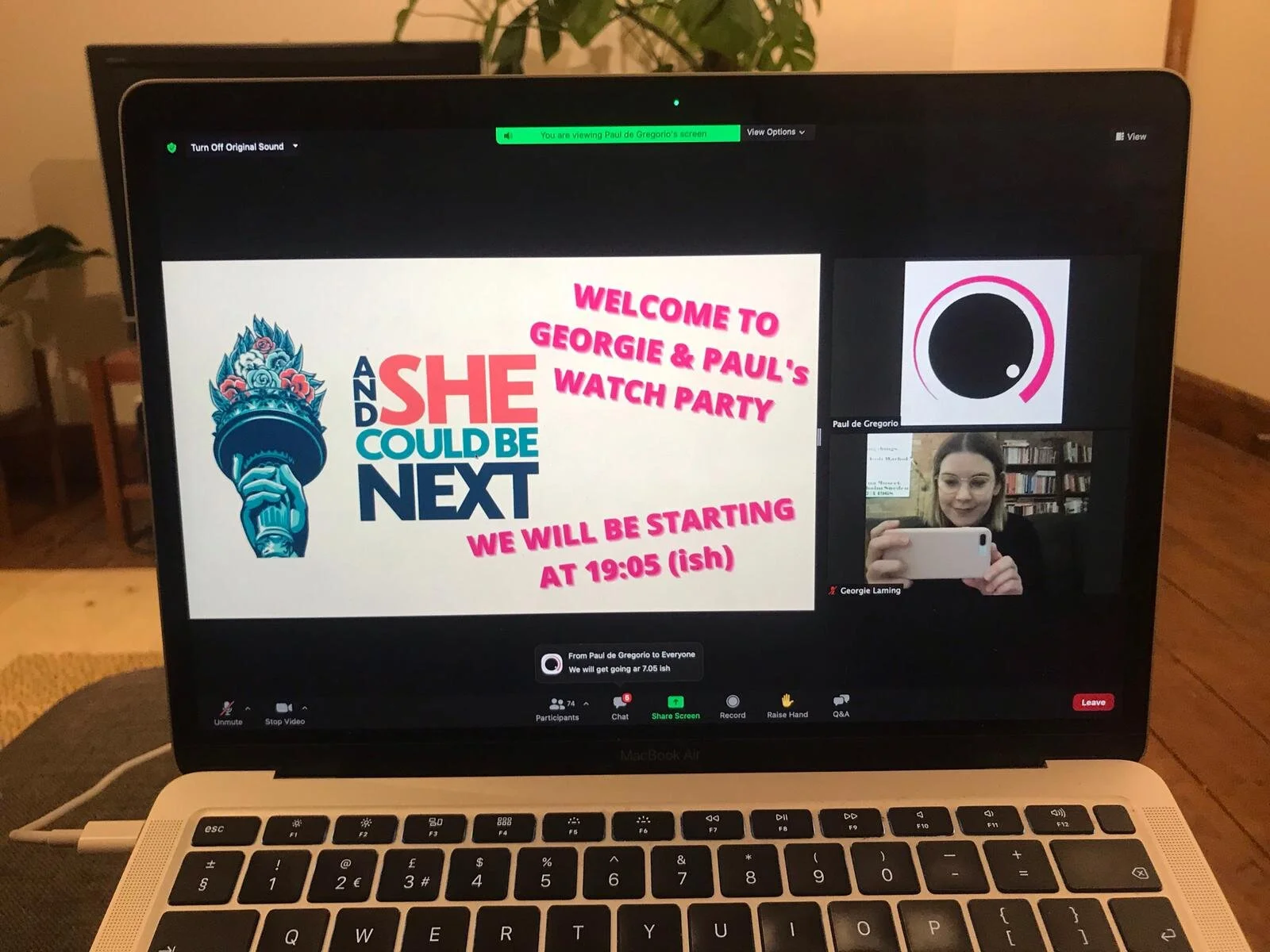The edition of Rally Reads where India says, “Let me be blunt: you don’t need to read any books to be a good campaigner. But learning from those that came before can help you avoid failure and build a winning strategy.”
SOLIDARITY. DOWNLOADABLE UKRAINIAN ACTIVIST ART.
RALLY READS: WITH LUCY CALDICOTT
LANGUAGE MATTERS: DO YOU ATTRACT OR ACQUIRE SUPPORT?
Language matters. It’s an obvious thing to say: how we choose to express ourselves gives an insight into how we think about the things we do, see and experience.
Take the word acquisition and think about its definition.
Acquisition: the buying or obtaining of assets or objects.
Buying or obtaining.
Assets or objects.
It's a word taken from the corporate world where customer acquisition is a thing. We'd argue that we should reject the term because we are not in the business of selling products or services. It’s a word that depersonalises the public and presents them as commodities rather than people.
Acquisition perpetuates an Old Power mindset of ownership:
My donors.
My supporters.
My staff.
My ideas.
My clients.
We believe in a New Power mindset of collaboration and sharing.
So we use the word attraction.
Attraction: the action or power of evoking interest in or liking for someone or something.
Rally works with clients, and the sector more widely, to champion an attraction-based approach. Together we develop strategies that help achieve our clients’ goals by using their values as a magnet to attract all who share them.
The focus is simple: to inspire like minded people who share our values to join us and actively participate in the change we all want to see.
And while we are on the subject of language. Here is the definition of another widely used sector term.
Retention: the continued use, existence, or possession of something or someone
Possession. Nice.
Main Photo by Marl Clevenger on Unsplash
RALLY READS: WITH DAMIAN O'BROIN
UK DIGITAL BENCHMARKS STUDY: A CAMPAIGNER'S PERSPECTIVE.
We’re delighted to bring you a campaigning / organising perspective on the UK Digital Benchmarks Study from Tom Baker. We love Tom for many reasons, not least his incredible and insightful blog, The Thoughtful Campaigner, where he writes about his observations of advocacy trends in the UK and beyond. Tom is Director of Campaigns and Organising at Save the Children UK, and has previously worked at Bond (the UK network for organisations working in international development), Tearfund and Christian Aid.
RALLY READS: WITH FIONA PATTISON
BRINGING PEOPLE TOGETHER TO BUILD POWER & MAKE TROUBLE.
Rally exists to help build power. To show people they have it and help them to use it.
One way to do this is to bring together like minded people who don’t know each other in an attempt to create connections that didn’t exist, which can lead to collaborations that otherwise wouldn’t have happened.
A few weeks ago our founder Paul de Gregorio and one of our favourite people in the world Georgie Laming, collaborated to put on a virtual screening of an episode of the incredible US documentary ‘And She Could Be Next’. In the film makers words - ‘a documentary series that focuses on a defiant movement of women of colour, transforming politics from the ground up’. Here’s the trailer…
RALLY READS: WITH RUBY BAYLEY
In this edition Ruby takes us through a reading list that explores strategy, anger, feminism and protest. Ruby describes herself as a fundraiser and feminist organiser. She’s raised hundreds of thousands of pounds for good causes in her career and is a fundamental believer in the art of protest. As are we.
A MOBILISATION MASTERCLASS FROM MARCUS RASHFORD…
If you’ve ever heard us talk out loud, you will have heard us talk about mobilisation.
What do we mean by mobilisation? Well, the dictionary defines it as…
‘The action of organising & encouraging a group of people to take collective action in pursuit of a particular objective’
And if you’ve heard us talk about mobilisation, it’s very likely that you’ve heard us talk a lot about the lessons we can learn from successful movements of the past and recent history.
We’ve summarised these lessons in the following 5 principles to consider when we’re talking to clients about mobilisation strategy and leadership.
A VISION TO BELIEVE IN: Your goal is inspiring, is important to society and feels believable.
A BELIEVABLE PLAN TO DELIVER THE VISION: Not only is the goal believable, but so is the plan to deliver it. The plan is well articulated and available for all to see. It’s easy for the public to see themselves playing an active role in success.
VALUES THAT ARE EASILY SUBSCRIBED TO: The values that underpin the mobilisation activity aren’t overly complex or intellectual, they have huge mass appeal and aren’t framed in a way that excludes participation.
USEFUL & VALUABLE THINGS TO DO: Those who participate are offered things to do that are rooted in the plan and connect to the values of the movement. Nothing is transactional - it’s clear every action moves the movement on towards its goal.
CHARISMATIC LEADERS OR LEADERSHIP: The leadership or individual leaders are inspiring and have the personal qualities that drive belief and loyalty. They speak with experience of the issue and can tell stories in a way that drives action and participation.
Let’s apply those principles to what we’ve seen Marcus Rashford do.
But first watch this video…
It’s hard not to be impressed by him. Back to those 5 principles and how Marcus exhibits the behaviours.
A VISION TO BELIEVE IN. Marcus believes that all children irrespective of their background should be able to fulfil their full potential. It’s hard to disagree with this.
A BELIEVABLE PLAN TO DELIVER THE VISION. He’s kept the plan simple, he uses his platform to call on the government to do the right thing. Whether it’s the provision of food in the short term or a review of how children are viewed by policy makers. He makes everything simple and easy to engage with.
VALUES THAT ARE EASILY SUBSCRIBED TO. Decency, equality, justice, compassion and fairness. It’s hard not to align with the core values that drive his efforts.
USEFUL & VALUABLE THINGS TO DO. He recognises that there is work he needs to do, which involves him using his power to get access to politicians and make direct asks of them. He asks the public to sit alongside his efforts and help by signing petitions, amplifying the campaign or in some cases providing food when the government wouldn’t.
CHARISMATIC LEADERS OR LEADERSHIP. We think he has this covered. He is a global star in his profession, speaks with direct experience of the issues he is campaigning about so he has authenticity baked in to everything he does and doesn’t fear any backlash. In a recent Guardian article it was reported that ‘he shrugs off criticism, saying he’s heard 10 times worse on the pitch. Setbacks make him redouble his efforts.’ Which is probably what makes him such a formidable activist.
There is a lot of talk about movement building in UK NGOs right now. This is a natural response to the new ways in which movements have formed and attracted public support and participation - think BLM, MeToo, TimesUp and the rise of XR. Charities need to learn from them because they are successful at attracting at scale and creating action, especially in the digital age.
If a movement is defined as ‘a group of people working together to advance their shared political, social or artistic ideas’, our view is that established charities cannot start one. They can harness the power of an existing movement, but can’t and shouldn’t think they can start one. This is a bold statement to make, but if you think of the environmental movement as an example, no one organisation can lay claim to owning it. There are a wide and diverse range of actors in that movement from charities like Greenpeace and the RSPB to campaign groups like XR, Green New Deal and Youth Climate strikers to brands like Lush and Patagonia - all are part of the movement, no single group can throw their logo on it and claim it.
Instead, charities should identify where they are in the movement ‘map’ that surrounds them and figure out what they can do to push the entire movement forward, as well as mobilise its power and energy to help them deliver on their specific goals. This could be as simple as providing resources and capacity to smaller groups in the movement.
We will leave you with this quote from that recent article in the Guardian.
“As global charities unsurprisingly clamour to hitch his star power to their causes, his response is always the same: “I need to fix what’s going on in my own backyard first.”
Link to that article: 'It is never about him': how Marcus Rashford became such a devastating activist. [The Guardian]
Main Image by Markus Spiske on Unsplash










